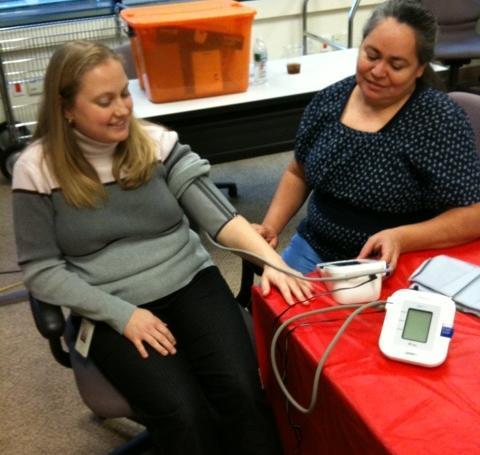Blood Pressure Screening
It is important to note that the values of your BP are useful for screening purposes only and should not be used for clinical risk assessment or make clinical decision. If you have high or low BP, it is your full responsibility to initiate a follow-up examination with your primary care physician to obtain advice and/or treatment.
| What is high blood pressure (HBP)? |
 |
| Who is at higher risk? | |
| How can I tell I have HBP? | |
| What can untreated high pressure lead to? | |
| What can I do about it? | |
| How can medicine help? | |
| How can I learn more? | |
No one knows exactly what causes most cases of high blood pressure. It usually can not be cured, but it can be controlled. It is often called the "Silent Killer."
About 50 million Americans and 1 in 4 adults have it, and many do not even know they have it. Not treating high blood pressure is dangerous. High blood pressure increases the risk of heart attach and stroke. You can live a healthier life if you treat and control it.
- People with close blood relatives who have HBP
- African Americans
- People over age 35
- Overweight people
- People who are not physically active
- People who use too much salt
- People who drink too much alcohol
- People with diabetes, gout and kidney disease
- Pregnant women
- Women who take birth control pills who are overweight, had HBP during pregnancy, have a family history of HBP or have mild kidney disease.
- Stroke
- Heart attack
- Heart failure
- Kidney failure
- Lose weight if you are overweight
- Eat healthy meals low in saturated fat, cholesterol and salt.
- Limit alcohol to no more than one drink per day for women or two drinks a day for men.
- Be more physically active.
- Take medicine the way your doctor tells you.
- Know what your blood pressure should be and work to keep it at that leve.
- Talk to your doctor, nurse or other health care professionals. If you have heart disease or have had a stroke, members of your family also may be at higher risk. It is very important for them to make changes now to lower their risk.
- Call 1-800-AHA-USA1 (1-800-242-8721), or visit www.americanheart.org to learn about heart disease.
- Visit our website at www.pleasanthealth.com and select high blood pressure from our "Services" menu.